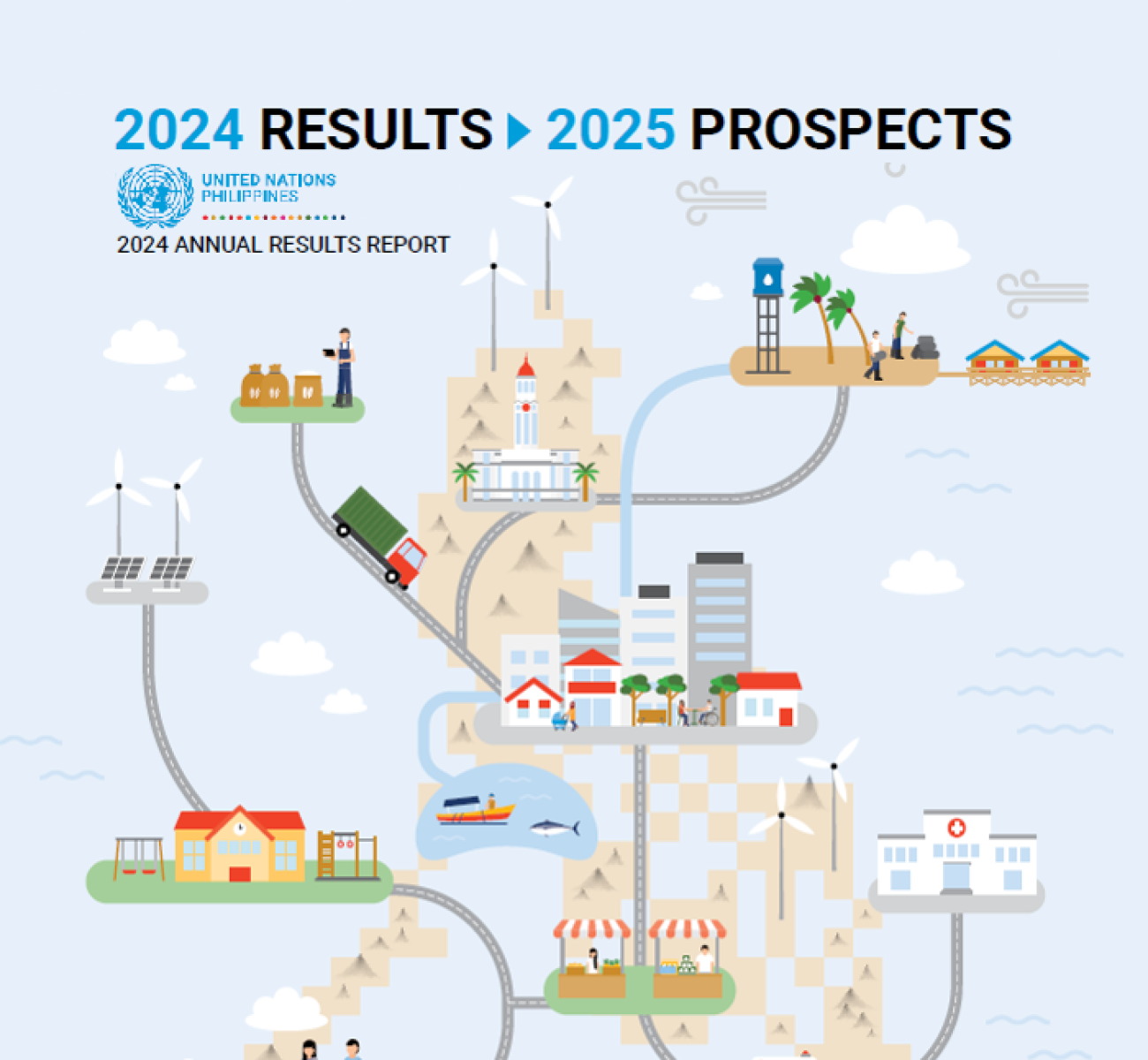Manila, 5 June 2025
In the first year of implementing the 2024–2028 Sustainable Development Cooperation Framework—the newly signed agreement outlining joint efforts with the Philippine Government—the United Nations delivered a wide range of programmes and projects. These supported domestic implementation and policy development across three priority areas: human development, inclusive economic growth, and environmental sustainability. The total financial volume of this work reached approximately $137 million, sourced from a diverse mix of bilateral, multilateral, and domestic partners.
The progress and contributions of the United Nations toward these development goals are detailed in the 2024 Annual Results Report, published last week. The report provides an overview of partnerships and joint initiatives, as well as the financial requirements and available resources needed to support the Philippines’ trajectory toward upper middle-income status.
“The country’s significant political, economic, and development gains are driving transformation in the Philippines. The United Nations is adapting its tools and support to align with these goals. Beyond projects, the UN in the Philippines is increasingly focusing on high-level policy advice and domestic implementation support—reflected in our shared achievements in 2024,” said UN Philippines Resident Coordinator Arnaud Peral.
“The Philippines remains a firm believer that solutions can be found in multilateral cooperation. The UN has a key role to play in developing countries, including middle-income countries, which are still hampered by structural vulnerabilities, including from climate disasters to inequality. We need a UN that aligns its programs and budget with national strategies, and listens to the country’s needs,” said the Philippines Secretary of Foreign Affairs Enrique Manalo.
Human development—encompassing healthcare, nutrition, education, housing, governance, and peacebuilding—accounted for the largest share of UN support, totalling $84.2 million.
In health, joint efforts between the government and the UN significantly improved child immunization rates, particularly against measles. As a result, the Philippines was removed from the list of the top 10 countries with the highest number of “zero-dose” children—those who have not received any vaccinations.
Collaborative initiatives also made a measurable impact on child education and protection. A school meals program improved both nutrition and attendance, while targeted projects addressed child labour, early and forced marriage, and adolescent pregnancy—helping keep children in school and safe from harm.
The UN also supported the mainstreaming of gender-responsive and human rights-based approaches in governance and social protection. Technical assistance contributed to key policy milestones, including the finalization of the Fourth Philippine Human Rights Plan, the convening of the Drug Policy and Law Reform Summit, and the passage of a bill protecting the rights of internally displaced persons in the Bangsamoro region.
The second-largest investment area—totalling $27.1 million—focused on sustainable economic development, innovation, and decent work. The UN provided targeted support to micro, small, and medium enterprises (MSMEs), which make up 99.5% of Philippine businesses. This included access to business and investment opportunities, capacity building, market linkages, internationalization, and digitalization, including training on artificial intelligence (AI) tools.
The Philippines also joined the Global Accelerator on Jobs and Social Protection for Just Transitions as a pathfinder country, with UN support. This initiative aims to mobilize global backing for the 10-year National Employment Masterplan and to develop an accelerator roadmap for the construction and transportation sectors.
Investments in environmental sustainability reached $25.7 million, covering disaster risk reduction (DRR), water and sanitation, resilience building, circular economy promotion, low-carbon development, and biodiversity management.
Efforts focused on transitioning to more sustainable practices and policies, including renewable energy and waste management. The UN also supported access and benefit-sharing schemes and biodiversity corridor policies to protect conservation areas and uphold the rights of indigenous communities who depend on these natural resources. Nearly 28,000 people directly benefited from UN-supported environmental initiatives.
In 2025 and beyond, the United Nations in the Philippines—long a key partner in disaster response, poverty reduction, and development—will continue to recalibrate its strategies to align with the country’s evolving priorities. There will be a stronger emphasis on supporting large-scale, multi-sectoral, nationally owned interventions, as well as sustained efforts in human capital development and transition support in the Bangsamoro Autonomous Region in Muslim Mindanao.
“As the United Nations approaches its 80th anniversary, its work remains deeply relevant in the Philippines, one of its founding members,” Mr. Peral said. “At the same time, the UN will work with the Philippines to showcase its experiences, good practices, and leadership globally. With its perseverance, resilience, ambition, and leadership, the Philippines has so much to offer the multilateral system—and the world.”


















